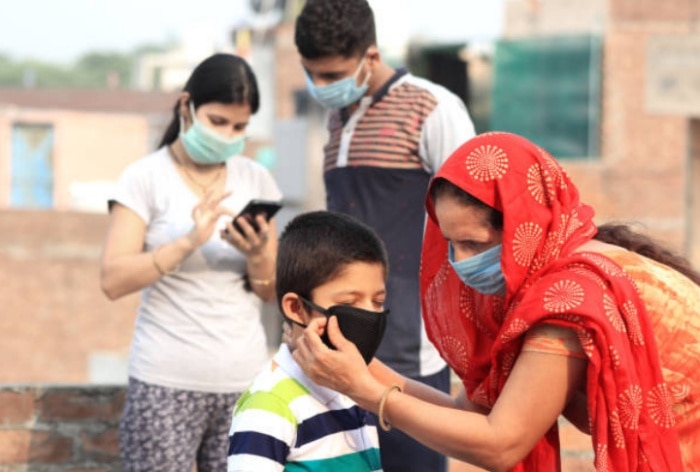India has logged 614 new cases of Covid-19, including 21 infections of JN.1 sub-variant in the past 24 hours– the highest daily count since May 21.
Covid-19 News: Uttar Pradesh’s Ghaziabad Wednesday logged the first case of of the Covid-19 virus in 8 months even as the country logged as 614 new coronavirus infections in the past 24 hours. According to data shared on the Union Health Ministry website, India has 2,311 active cases that include 21 cases of the JN.1 sub-variant which have been detected in Goa, Kerala, Maharashtra, and now Uttar Pradesh.
As per the data updated at 8 AM on Wednesday, 614 new cases were recorded across the country during the past 24 hours, taking the number of active cases to 2,311. Three deaths were reported during the same period from Kerala and two from Karnataka thus taking the number of Covid-19 related deaths to 5.22 lakh since the pandemic broke out.
This is the highest number of cases recorded in a single day since May 21 this year.
The ministry data revealed that Kerala has registered most active cases, logging 292 new infections in the past 24 hours. The other cases have been recorded in Tamil Nadu (13), Maharashtra (11 ), Karnataka (9), Telangana and Puducherry (4), Delhi and Gujarat (3), and Goa and Punjab (1 each).
Karnataka records two Covid-19 deaths
According to a Health bulletin issued on Wednesday, two Covid-19 related deaths and 20 fresh cases were reported in Karnataka in the past 24 hours. The deceased, -both men- aged 44 and 76- respectively died on December 16 and 17 in Bengaluru. One of them was asymptomatic while the other patient complained of breathlessness, the bulletin revealed.
Earlier in the day, Karnataka Health Minister Dinesh Gundu Rao said that a 64-year-old man died in the city due to Covid-19 infection five days ago. Asked if the cause of death was the new subvariant JN.1 of the SARS CoV-2 virus, he said it was not known so far.
The person, who had comorbidities, was a resident of Chamarajpet and died on December 15, the Minister told reporters.
In the last 24 hours, a total of 808 tests were done across various districts in the state, out of which 407 were RT-PCR and 401 were Rapid Antigen Tests. The covid positivity rate in the state stood at 2.49 per cent while the case fatality rate stood at 10 per cent, it stated.
As of Wednesday, there are 92 active cases in Karnataka, of which, 72 are in home isolation, 20 in hospital, seven in ICU and 13 in general ward, it added.
‘No need to panic’, say experts
Meanwhile, experts have urged the public not to panic as the available treatments are effective, the infection is mild and all viruses mutate.
“As it happens with most respiratory viruses, including the influenza viruses, the circulating viruses keep changing. Therefore, a sub-variant of SARS CoV-2 is not a surprise at all,” Chandrakant Lahariya, a senior consultant physician and public health expert, told news agency PTI.
The SARS-CoV-2 virus is circulating in all settings, he said.
Addressing concerns about the spread of JN.1, health experts said precautions are a must but there is no need for alarm as it is natural for viruses to mutate in the due course of evolution.
“In India, people have already been exposed to various sub-variants, including Omicron variants, and received at least two shots of COVID-19 vaccines. There is no renewed risk of SARS-CoV-2 variant or sub-variant causing severe illness,” Lahariya said.
Kartik Vedula, infectious diseases consultant at Hyderabad’s Yashoda Hospitals, agreed. He said JN.1 is a new sub-lineage of BA.2.86, an offshoot of the Omicron variant.
“JN.1 differs with an additional mutation in the spike protein. Studies have shown that JN.1 has enhanced immune evasion properties, with the potential for enhanced transmission. However, there is no current data that shows new or severe symptoms in JN.1 infected individuals, and the public need not panic,” Vedula told PTI.
Adding a note of reassurance, Vinod Scaria, senior consultant at Mumbai’s Vishwanath Cancer Foundation, said the JN.1 variant has possibly been in circulation in India as early as November 2023.
“While this would mean reinfections would pick up significantly, there is no evidence to suggest JN.1 could pose a significant threat to public health compared to other variants in circulation,” he added.
WHO classifies JN.1 as Covid-19 sub-variant
On Tuesday, the World Health Organisation (WHO) classified JN.1 as a separate variant of interest (VOI) from the parent lineage BA.2.86. It was previously classified as VOI as part of BA.2.86 sublineages.
The WHO defines a variant of interest as one that has genetic changes which could increase its transmissibility, virulence, and its ability to evade vaccines.
Based on the available evidence, the additional global public health risk posed by JN.1 is currently evaluated as low, WHO said.
“Despite this, with the onset of winter in the Northern Hemisphere, JN.1 could increase the burden of respiratory infections in many countries,” it added.
India has also alerted states to take necessary precautionary measures.
JN.1 was first detected in Denmark and Israel in late July 2023.
(With inputs from agencies)
–>
